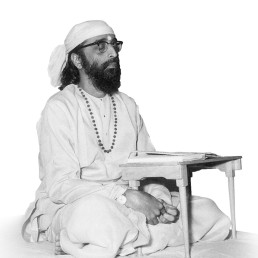
Jnana Yajna 50

Year & Dates:
December 07, 1958 to December 26, 1958

Yajna Topic:
Atma Bodha

Place:
Thrippunithura, India.
“From the garden of the Upanishads, strung together on the chord of His poetry, interspersed with his exquisite similes, the wonderful garland offered by Adi Shankara to adorn Mother Shruti is Atma Bodha.” This is how Pujya Gurudev introduced the beautiful ‘Prakarana Grantha,’ the prefatory textbook which explains the different terms and terminologies of Vedanta.
Pujya Gurudev began 1958 with a Jnana Yajna on Atma Bodha in Calcutta. He ended 1958 with Atma Bodha again in the 50th Jnana Yajna in the southern town of Thrippunithura in Kerala. Once the capital of the erstwhile Kingdom of Cochin (Kochi), Thrippunithura is a cultural, historic hub. Home of the almost 5000-year-old Poornathrayeesha temple where Bhagavan Vishnu, the presiding deity of the city, is worshiped as Santanagopala Murthy, Thrippunithura was known as Poornavedapuram in the past.
Poetic, Self-Shining Vedanta
The location was holy, and the seekers were ready. Pujya Gurudev had been teaching Atma Bodha in His morning classes all over India, and He decided that it would be the focus of the 50th Jnana Yajna in the evenings from 5:30 pm to 7 pm. The aspirants of Thiruppunithura were truly blessed to hear the enriching analogies in the sixty-eight verse text of Atma Bodha along with Pujya Gurudev’s lucid explanations during the mornings on another Prakarana Grantha – the sparkling Vivekachoodamani.
With His poetic and Vedantic prowess, Pujya Gurudev portrayed the beauty of Self-Knowledge. The examples tucked in every verse so skillfully by the Vedantic Master, Shri Adi Sankara, took vivid shape in the seekers’ minds. To visualize the Self like the lustrous Sun emerging from the clouds, the false glitz of the world like the glint of a mother-of-pearl, and to recognize the individual self conditioned like a crystal upon a blue cloth – Pujya Gurudev made the attentive audience soar to the heights of reflection. In the morning discourses, He emphasized the importance of the four-fold qualifications of seekers (sadhana chatushtaya).
Always fortifying knowledge with devotion, Pujya Gurudev arranged for the unique Vishnu Sahasranama Laksharchana at Thrippunithura on December 14th as the audience from the Ernakulam yajna joined in the collective worship. For the Avabhrta snaana after the kirtan and havana, Pujya Gurudev led all to the serene beach of Kovalam (near Thiruvananthapuram). The calm beach overseeing the endless waves and the expansive blue sky provided the perfect environment for the people to introspect on Atma Bodha. The 50th Jnana Yajna of Pujya Gurudev was pure immersion into the brilliant basics of Vedanta.

“Think,” Says Pujya Gurudev
An individual—who has thus (a) weakened his wrong tendencies through Tapas, (b) who has consequently found in himself a relatively greater mental calmness, (c) in whom the desire-agitations are temporarily at rest,—if he be, (d) one who is a sincere seeker wanting to liberate himself from his known personality shackles, felt in his own within, he is the one who is fit for the study of the Atma-Bodha.
From Atma Bodha, Book
The example here (verse. 22) is of an image of the moon reflected in a bucket of water which seems to shiver when the water surface is disturbed. When the water calms down and becomes steady, we do not see the shattered moon in the bucket-of-water re-assembling to form one whole. Similarly, when one has purified one’s mind and has consolidated its strength and has reconstructed it to be firm and steady by narrowing down its various unholy, unhelpful and selfish thoughts, the glory of the Self gets automatically reflected in all its beauty within oneself—unshaken by the dualities around and the consequent agitations.
From Atma Bodha, Book
What is the use of Spiritual Practices?
In this enlightening discussion, Pujya Gurudev Swami Chinmayananda utilizes the analogy of cooking rice to shed light on the process of spiritual evolution. By exploring the elements of Sadhana – Karma, Bhakti, and Jnana – discover how they harmonize to cultivate the mind for enlightenment. Explore the transformative power of direct knowledge in realizing the true nature of existence.